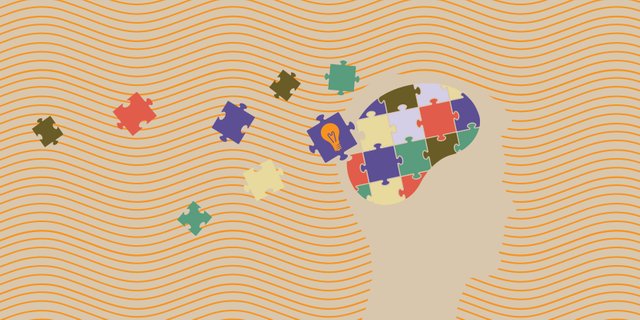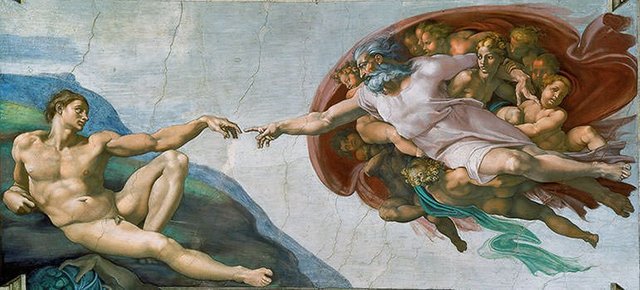Geometric Morality # 2: Justice
I am writing a mini series of three writings on geometric morality philosophy. His name was taken from the opening statement of Spinoza's book, Ethica. I will write the views of famous thinkers on various concepts and situations and try to examine these views.

"The existing design of life responds neither to consciousness nor to the needs of the mind. Imagine a dove in a corn field. Ninety-nine of the pigeons are gathering corn with a bull. But instead of using it to get what they need, they accumulate it in a big chunk. They don't give a lot of corn to themself. Imagine hiding this mass of corn in the name of the most worthless and the worst in the lot. Then the pigeons make a ring and they sit and watch that single pigeon that is hacking this fortune. Imagine, at the end, the weakest dove in them, unable to stand up to hunger and try to get one from the stack without permission. They all attack him and punish him. If you can visualize it in front of you, you can understand the daily behavior of mankind." says William Paley.
For Paley's short story and the basic point she wants to tell, Tolstoy said, "People are logical creatures. Why, instead of relying mind in relationships, they resort to violence so easily?" as a question. So far, we've met with three key words to watch out for. Punishment, Pigeon and Violence. I specifically mention them because the continuation of the article will be based on these three words and their common point.
Pigeon Superstition
In cases where the human brain is experiencing or is in a situation where it is encountered, the cause-and-effect pattern is always searched. A person who thinks of the existence of free will and wants to believe it enters into a search for causality, especially in bad things that happen to him. This is not just about us, it is also observed in animals. And this situation observed over pigeons is called Pigeon Superstition. Mr. Nobody movie has a nice opening scene on this subject. If you haven't just watched the movie, I would recommend watching it at the first opportunity. It's a movie that will question your choices.
Plotinus, an ancient Greek philosopher, has a good word on this subject:
"All our ideas will be determined by an earlier chain of causes; personal actions are not real, since we are determined by these ideas. As long as our actions are predetermined by these reasons, we have to be our tool is not enough to save our freedom."
In the case of Paley, there is injustice, exploitation and violence. A totalitarian pigeon not only allows others to work for himself, but also allows them to maintain this order. How can pigeons get rid of it if the situation is as Platinus said, if the events are purely causal and there is no such thing as free will?

Punishment and Injustice
It is really enjoyable to read Plato and Socrates who adopt and implement the system of dialectical thinking. You can see a sharp intelligence among the words. Plato makes the following definition for the concept of justice in a book, "Justice is to give everyone what is appropriate for him."
If the pigeon believes that the thing given to him is the most ideal thing for him ... What if a courageous pigeon sees the wrongness of this situation and deserves what it deserves as opposed to being presented? It is punished by other pigeons like the example of Paley. Can he blame these pigeon friends who are punished, violent, even though they are right? In the end, he has suffered an injustice, and this must be a reward. But what kind of punishment would be fair for them if there is no free will as Platinus says?
Violence and Power
"Who fights with monsters should be careful. Because it will be a monster." says Friedrich Nietzsche. In Paley's example, the pigeon who wants to take what is right is punished and violent by others. This is actually a situation that is constantly confronted in everyday life. It's like the kings always support the monarchy. What should a person do if there is no system of justice to appeal?
In such circumstances in history, the party that receives the injustice gains power. In order to stop the people he struggles with, he starts to turn into the person he struggles with after a certain point. Here again there is a causal relation as the determinist thinker emphasizes. Just as Descartes is in the case of the King and the Duel. So if we accept the notion that there is no free will, the notion of justice collapses. Every punishment will be unfair. Hence, in order to have a functioning justice system, first of all, there must be a free will. However, crimes committed on this point can be punished fairly.

Excellent post. Very relevant perspectives rest in it.
Have you read Gorgias? It’s one of my favorite workings of Plato. The depth in every thought presented in the arguments is so impressive.
I personally believe that the logic and reason these men possessed, if adopted by today’s people, would help reach more agreeing perspectives. The type of perspectives that force people to be progressive for the betterment of all. For instance, in Gorgias Socrates spends his time arguing with a king that a life spent indulging in desires is not a healthy existence and it forces the king to be disgustingly prideful or change his attitude. When you back someone in a corner like this, their true nature is revealed.
You are right, if today's people think as much as logic as half of philosophers, the world will be very different. There is always emotion in the work, sometimes good-will emotions can turn into bad. Philosophy teaches people to think without emotions in this point.
thank you
Perfect article. I though disagree with the conclusion. Regardless whether there is or is not free will (i think not) punishment can be just. If the consensus is reached about what is and what is not destructive for any given community (of any size), punishing the destructive nature can be just. If the punished being would be able to think rationally he would actually see it as fair justice, because he knew at the first point that he is doing a destructive act.
At the end, justice is "doing fair acts". There has to be a point of view in order to decide whether something is fair or not. The point of view always should be the community’s best interest, because that is the enabling entity of violent acts (in the name of justice). But everyone of course has to be part of the community willingly (that is though different topic to discuss).
Thank you for your comment. It's realy nice to see other opinions :)
What is fair acts? To be fair is relative. Justice is relative. If you was read Politeia, you saw what I mean. Many terms are actually subjective. The rules set for it always have a hole. I think a perfect law is not possible. You can not be fair where you do not have perfection.
Well I don’t need to read it to know that it is subjective. I actually said exactly that ("there has to be a point of view"= subjectivity)!
I also was not talking about perfect law, only justice. If the rules are set to benefit the society (if everyone in the society was not forced to agree on them), then the only hole it all has is that someone might be accused of something he did not do and he wouldn’t have any prove, or someone would do something bad and there wouldn’t be anything to prove it with. But those are not holes in the "justice system" but rather in the means of gathering information. The "justice system" doesn’t have to be perfect as long as those who are part of it agreed to it. Then it can safely be called justice even if there is no free will. Whatever makes the decisions have accepted the rules, and if they are broken, the individual is met with justice, free will, or not free will.
Well I guess I can agree with you for that part;
Because that is really good point and sorry for "there has to be a point of view", I missed :)
As I said it was a perfect article compiling work and thoughts of many great philosophers. I’m glad that at the end we managed to agree even on the summary:)